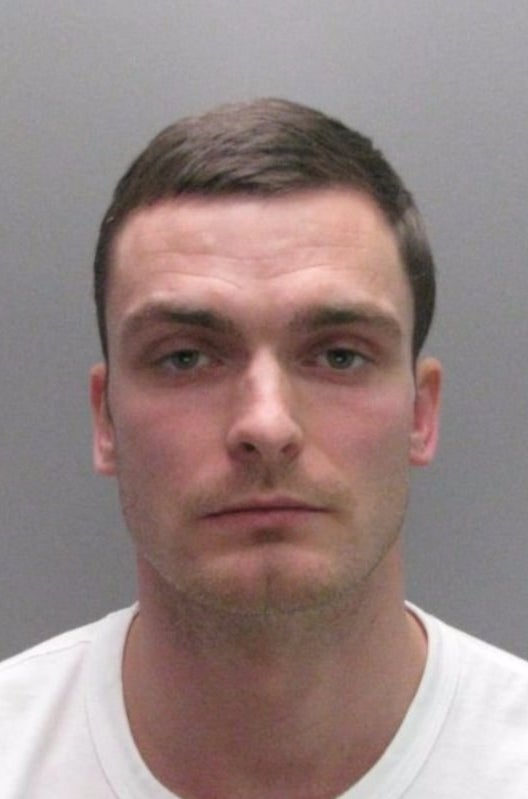Former Premier League footballer Adam Johnson has been found guilty of sexual conduct with a 15-year-old fan who idolised him.

Johnson was convicted on Wednesday after a trial at Bradford crown court concerning his relationship with a fan whom he had already admitted grooming via social media and kissing.
The jury returned a 10-2 majority verdict on a charge relating to whether he put his hand inside the girl's underwear.
He was told that a jail sentence was now an "almost inevitable outcome".
Johnson, who intends to appeal the conviction, had been cleared of a separate charge of sexual activity with a child specifically related to whether he received oral sex from the girl.
Adam Johnson was found not guilty of one count of sexual activity with a child, specifically that the girl performed oral sex on him.
Judge tells Adam Johnson prison is 'almost inevitable' after he is found guilty of sexual activity with a child. Not guilty on other count.
On Tuesday Judge Jonathan Rose told jurors they must return a unanimous verdict on both counts, telling them: "12-0 is the only possible score." But on Wednesday the judge said a majority verdict would in fact be enough on this final outstanding charge.
The 28-year-old former England winger was fired from Sunderland after he pleaded guilty to one charge of grooming and one charge of sexual activity with a child on the eve of the trial.
The court heard that Johnson met the girl, a "massive Sunderland fan" who cannot be named because of legal reasons, in his black Range Rover on 17 January last year and gave her two signed replica shirts. The pair met again on 30 January, when Johnson admits kissing took place.
Kate Blackwell QC, prosecuting, told the jury that Johnson was "manipulative" and was "lying that it went no further than a kiss".
Blackwell said in court last week that Johnson, who earned £60,000 a week, had "cheated on his girlfriend and lied and manipulated her in a way which demonstrates his exceptional duplicity".


Johnson's defence argued that the girl, who complained to police in February last year, was lying. His counsel told the court that the allegations had done "irreparable damage" to his career.
The judge had told the jury that whether or not the girl had consented to possible sexual acts was irrelevant to the charges against Johnson.
The judge outlined a series of instances where Johnson had misled the police and his girlfriend about meeting the girl. When he was arrested, he told officers, "well she said she was 16", although the court heard transcripts of text messages in which the girl clearly said she was 15.
The court heard that Johnson had searched online for the legal age of consent.
However, Rose made clear that the lies from Johnson were not enough to convict him on the sexual activity charges.
The girl told the court she was no longer protecting the player she had idolised as a Sunderland supporter.
During the trial it emerged that Johnson's former club, Sunderland, had allowed Johnson to carry on playing and earning his salary despite knowing "everything" about his arrest and pending trial.

Johnson's barrister, Orlando Pownall QC, told the court last week that the club let him play for the best part of a year because they were locked in a relegation battle at the bottom of the Premier League.
According to the Mirror, Pownall said: "It's plain Sunderland Football Club knew exactly what was going on, they choose for what ever reason, rightly or wrongly, whether for commercial considerations or in the knowledge they were facing relegation, they allowed him to play.
"It might be in hindsight they regret that decision."
The club said in a long statement on its website, issued after the verdict, that it did suspend him after he was arrested on 2 March 2015.
But then the club reversed his suspension and allowed him to play two weeks later after a meeting with the Professional Footballers' Association and after carrying out a "safeguarding assessment". Sunderland pointed out that Johnson denied all the charges until the first day of the trial.
"The club did not give evidence either for the prosecution or the defence in this case," the statement said. "It was therefore not present in court when it is understood that a suggestion was made that the club knew all along that Johnson was intending to change his plea just before trial to enable him to continue to play football for the club and that the club may also have been involved in tactical discussions about the plea.
"This is utterly without foundation and is refuted in the strongest possible terms. The club never placed any pressure or demands on Johnson to play football during this process."
The club stressed that it was "not advised in advance that Johnson would plead guilty to any offence" and that if it did know he would have changed his plea "his employment would have been terminated immediately".
